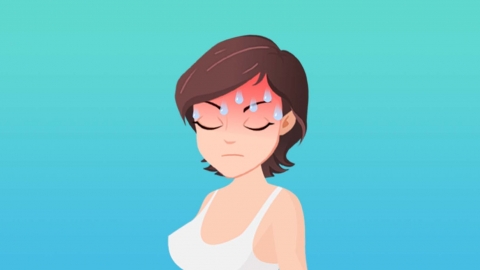What causes excessive sweating?
Generally, excessive sweating may be caused by high environmental temperature, emotional stress, hyperhidrosis, hyperthyroidism, diabetes, and other factors. It is recommended to seek medical attention promptly, identify the underlying cause, and receive symptomatic treatment under a doctor's guidance. Specific analysis is as follows:

1. High environmental temperature: In hot, stuffy, or poorly ventilated environments, the body regulates its temperature by activating sweat glands to produce large amounts of sweat, leading to easy perspiration. Move promptly to a cool, well-ventilated area, reduce clothing, wear breathable and moisture-absorbing cotton garments, and drink moderate amounts of warm water to replenish fluids and prevent dehydration.
2. Emotional stress: Prolonged anxiety, excessive pressure, or being in a tense state can stimulate the sympathetic nervous system, increasing sweat gland secretion and resulting in excessive sweating—particularly noticeable on palms, soles, and underarms. Practicing deep breathing, meditation, or listening to calming music can help regulate emotions and relieve tension.
3. Hyperhidrosis: Caused by genetic factors or sympathetic nervous system dysfunction, this condition leads to abnormally overactive sweat glands. Excessive sweating occurs even in calm and cool environments, affecting daily life. Topical medications such as aluminum chloride solution, methenamine solution, or formaldehyde solution may be used as directed by a physician to reduce sweat production.
4. Hyperthyroidism: Excess thyroid hormone accelerates metabolism and increases heat production, stimulating sweat glands and causing excessive sweating. This is often accompanied by symptoms such as palpitations, hand tremors, and weight loss. Medications such as methimazole tablets, propylthiouracil tablets, or carbimazole tablets may be prescribed to inhibit thyroid hormone synthesis.
5. Diabetes: Poor blood glucose control leads to metabolic disturbances and possible autonomic nerve dysfunction, resulting in abnormal sweat gland activity and excessive sweating. Additional symptoms may include increased thirst, frequent urination, and fatigue. Strict blood glucose control is essential, using medications such as metformin hydrochloride tablets, gliclazide modified-release tablets, or insulin injection solution as prescribed.
In daily life, it is important to keep the skin clean and dry, change clothes promptly after sweating, and avoid prolonged sweat retention that may irritate the skin. Wear loose, breathable clothing, reduce intake of spicy and irritating foods, avoid overexertion, and improve excessive sweating through comprehensive lifestyle adjustments.






